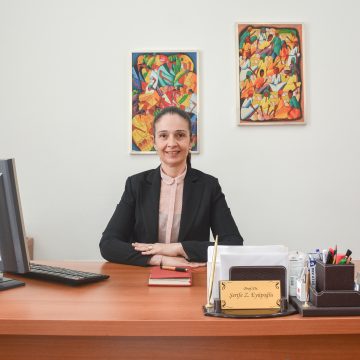
The Faculty of Economics and Administrative Sciences began enrolling students in 1988 with two departments and two undergraduate programmes, namely Business Administration and Computer Information Sytems. As of the beginning of the 2017-18 Academic Year the Faculty has 13 departments that offer 12 English and 13 Turkish undergraduate programmes, 11 English and 1 Turkish master programmes, and 4 English doctoral programmes. The Faculty employs 48 full-time and 30 part-time members of staff. The Faculty is proud to be host to students from a vast array of different countries from all around the world. There are over 1400 students (60% international students, 26% from Turkey, 14% local) studying at the various undergraduate programmes in the Faculty.
In light of Near East University’s vision, the vision of the Faculty of Economics and Administrative Sciences is “to become a faculty that is internationally recognized for its academic, educational, and scientific activities” In this sense the Faculty, with its young and dynamic academic staff, aims to provide students with a contemporary education that will contribute to the development of quality individuals who are equipped with global knowledge and skills to cope with the continuous changes and developments nationally as well as globally. Our Faculty has positioned itself to ensure a student-centered education. As a result, our academic staff are open and accessible to all students and they are committed to an effective teacher-student interaction and teaching both in and out of the classroom. We give importance to teaching effectiveness and believe that students should be active learners. Therefore as a Faculty we support the use of interactive teaching methods such as case studies, projects, in-class exercises, group work and class discussions.
Likewise, as a Faculty we support an academic environment in which the creation and dissemination of knowledge is encouraged, as well as encouraging the development of our academic staff. Our academic staff remain up-to-date in their teaching fields through the research they conduct and their publications in scholarly journals.
The curriculum of each programme is well designed to balance theoretical and practical, as well as core/main area courses and area elective courses. The first two years of the undergraduate programmes cover the common compulsory courses. During the first two years, students gain a well established formation and comprehensive theoretical knowledge through these courses. The knowledge acquired during the first two years forms the foundation of a solid knowledge and prepares students for the core/main courses from the third year on. The elective courses provide students with the opportunity to pursue their areas of interest. The programmes are constantly updated to provide our students with a contemporary education. Our Faculty houses a broad range of programmes, therefore each student can find the opportunity to enroll in an undergraduate programme addressing his/her interest.
The design of each programmes in the Faculty appropriately takes into account the required international aspects with respect to our graduates’ employability. The international orientation is an important aspect of all programme curriculums. Likewise the Faculty serves an internationally diverse student body and it employs Faculty members with diverse backgrounds and experiences. The programme curriculums emphasizes national and international focus in that students take courses (core and elective) with an international focus. These courses provide students with the skills to handle international tasks contributing to their employability. Also, course materials, such as case studies, and text books are preferred from the international environment. Furthermore, due to the international student population students in class are able to participate in discussions with individuals from different cultural backgrounds and points-of-view. This provides the Faculty students with the opportunity to mix and experience different cultures which in turn will be a valuable experience for them in their future careers.
Last year (June 2017) five of our programmes were accredited by internationally recognized accreditation institutions. The programmes Business Administration, Banking and Finance, Economics, and International Relations have all been accredited by FIBAA (The Foundation for International Business Administration Accreditation) and the Computer Information Systems programme has been accredited by ASIIN (Accreditation Agency for Degree Programs in Engineering, Informatics/Computer Science, the Natural Sciences and Mathematics). The seal of quality awarded to our programs by these two institutions is an indication that our programs are particularly worthy of being singled out due to their quality, as well as the sustainable and innovative nature of their content.
It is a privilege to be a member of the Faculty of Economics and Administrative Sciences at the Near East University. It is with great pleasure that I wish you all a warm welcome to the Near East family.
Prof. Dr. Şerife Eyüpoğlu
Dean